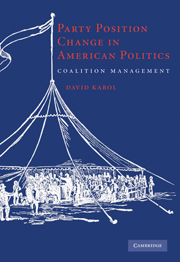6 - Conclusions
Published online by Cambridge University Press: 05 June 2012
Summary
In this book I have sought to highlight major changes in the positioning of American political parties in the last 50 years and to identify an underlying logic that would enhance our understanding of parties. As a result, my emphasis has been on change. Yet it is worth recalling that amid all the change in the policies and coalitions of the Democrats and Republicans there is much stability as well. The essential nature of American political parties, election-oriented coalitions of groups with intense preferences on distinct policies managed by politicians, has remained constant. Important continuities in party coalitions are also visible. Republicans' alignment with the business community, evident already in Lincoln's day, is one example. The parallel alignment of organized labor with the Democrats is more recent, but still in its eighth decade. A host of relative party policy positions consistent with the stable preferences of these coalition components, such as on labor-management relations and the welfare state, have remained in place for generations.
Yet the policies and coalitions of the Democratic and Republican parties have changed radically since 1960. Many of the parties' defining policy stands are relatively recent, as are the affiliations of many of the component groups with the contemporary Democratic and Republican coalitions. Recognizing this puts a new perspective on two major findings widely discussed by students of American politics: that the parties have “polarized,” and that this is a result of replacement because legislators' overall spatial positions are stable.
- Type
- Chapter
- Information
- Party Position Change in American PoliticsCoalition Management, pp. 182 - 190Publisher: Cambridge University PressPrint publication year: 2009



